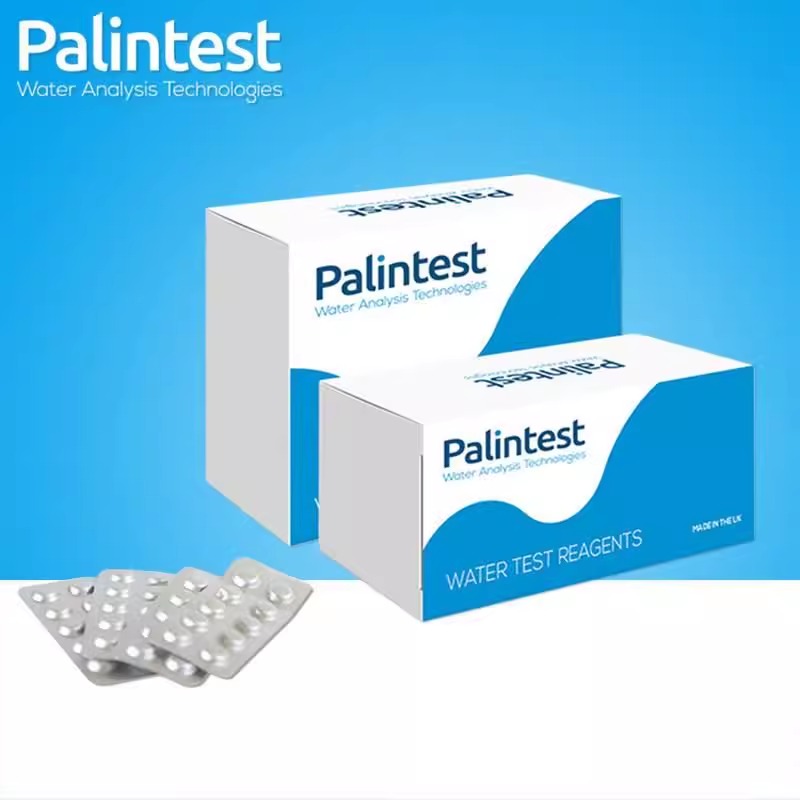Ammonia, Photometer, 0-1mg/L N, for 50 Tests
Catalog No :
CAS Number :
Brand :
In Stock
Specifications:
| Application | Water Quality Analysis | ||
| Storage Temperature | Room Temperature | ||
| Product Type | Photometer Reagent | Forms | Tablets |
| Product Brand | Palintest | ||
| Product Grade | Analytical grade | ||
Ammonia
(Indophenol 1N)
Test Method Technical Information
Tests For: Ammonia in natural, drinking and waste waters
Test Range: 0–1.0 mg/L N
Reagent Chemistry Used: Salicylate
Basis of Test Method: 4500-Ammonia-F, US EPA 350.1, ISO15750:2009
Method Detection Limit*: 0.03 mg/L
Limit of Quantification**: 0.07 mg/L
*The Method Detection Limit (MDL) is defined as the minimum measured concentration of a substance that can be reported with 99% confidence to be different from the method blank results.
**The Limit of Quantification (LOQ) is the smallest quantity that can be detected with reasonable certainty for a given analytical procedure.
Testing for Ammonia
Ammonia occurs as a breakdown product of nitrogenous material in natural waters. It is also found in domestic effluents and certain industrial waste waters. Ammonia is harmful to fish and other forms of aquatic life, and the ammonia level must be carefully controlled in water used for fish farms and aquariums. Ammonia tests are routinely applied for pollution control on effluents and waste waters, and for the monitoring of drinking water supplies.
The Palintest Ammonia Test provides a simple method of measuring ammonia (ammoniacal nitrogen) over the range 0 – 1.0 mg/l N.
Reagent Chemistry
The Palintest Ammonia test is based on an indophenol method. Ammonia reacts with alkaline salicylate in the presence of chlorine to form a green-blue indophenol complex. Catalysts are incorporated to ensure complete and rapid colour develop¬ment. The reagents are provided in the form of two tablets for maximum conveni¬ence. The test is simply carried out by adding one of each tablet to a sample of the water.
The intensity of the colour produced in the test is proportional to the ammonia concentration and is measured using a Palintest Photometer.
Interferences
In sea water or brackish water samples, Palintest Ammonia Conditioning Reagent is required to prevent precipitation of salts. The reagent is supplied in a special ‘spoon pack’ to aid measuring out the powder.
Fill the test tube with sample to the 10 ml mark and add one level spoonful of conditioning reagent. Mix to dissolve reagent then continue the test as described in the above test instructions. If turbidity still forms in the test, repeat using two level spoonfuls of conditioning reagent.
Best Practice Advice for Testing
- At low temperatures the rate of colour development in the test may be slower. If the sample temperature is below 20°C allow 15 minutes for the colour to develop.
- Thoroughly crush both tablets until fully dissolved for best results
- Brackish samples may only require a single spoonful of conditioning reagent to prevent turbidity forming
STEP ONE
 Fill to the 10 mL line with sample.02
Fill to the 10 mL line with sample.02
STEP TWO
 For seawater samples only, add two spoonfuls of Ammonia Conditioning reagent and mix well. Otherwise skip this step.
For seawater samples only, add two spoonfuls of Ammonia Conditioning reagent and mix well. Otherwise skip this step.
STEP FOUR
 Use this to "blank" the instrument. Place in cell holder and press Blank.
Use this to "blank" the instrument. Place in cell holder and press Blank.
STEP FIVE
 Prepare sample by adding an Ammonia No1 tablet and an Ammonia No2 tablet. Crush both tablets and stir.
Prepare sample by adding an Ammonia No1 tablet and an Ammonia No2 tablet. Crush both tablets and stir.
STEP SIX
 Place in the cell holder and press Measure.
Place in the cell holder and press Measure.
STEP SEVEN
 Allow timer to count down 10 minutes. The concentration of Ammonia will then be displayed. Note: Check full test instructions if sample is below 20⁰C.
Allow timer to count down 10 minutes. The concentration of Ammonia will then be displayed. Note: Check full test instructions if sample is below 20⁰C.




 0
0
